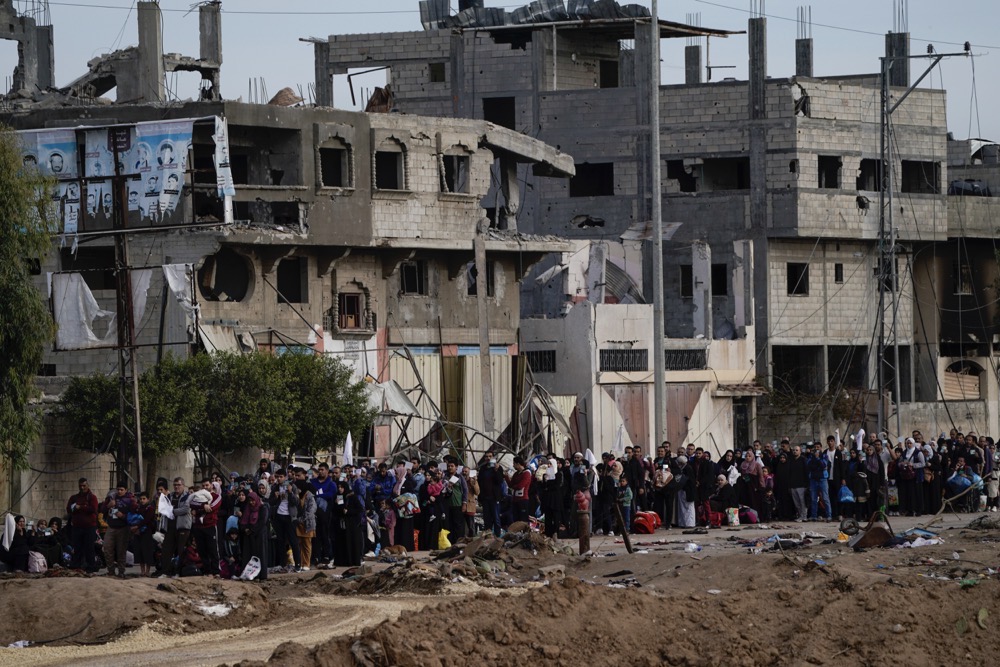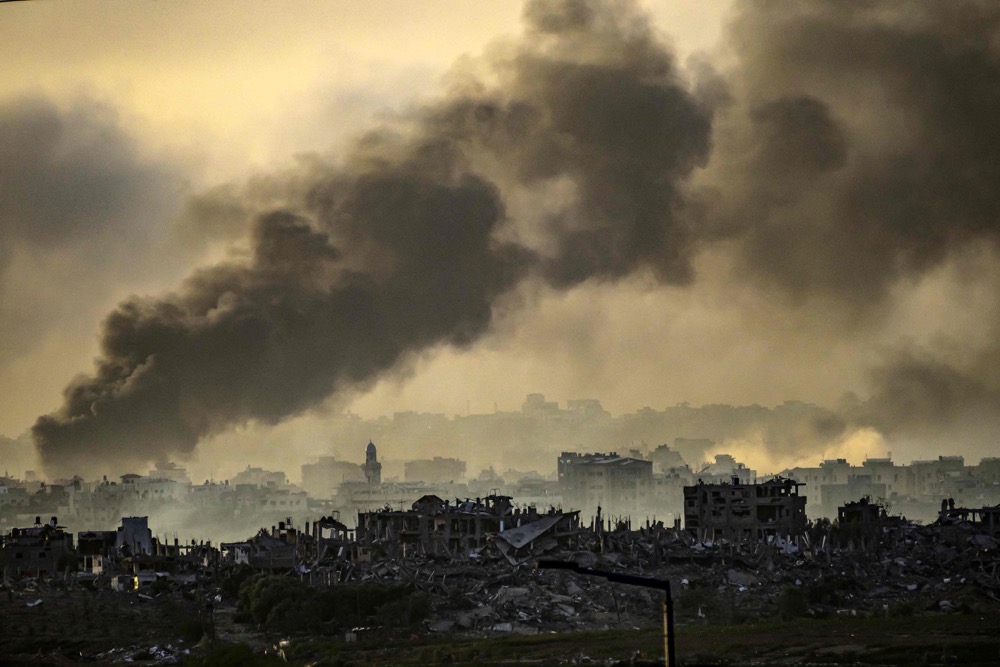LONDON: Humanitarian aid organizations want the four-day truce between Israel and the Palestinian militant group Hamas that came into effect on Friday in Gaza after weeks of fighting to become a permanent ceasefire.
The truce is intended to facilitate the flow of aid into Gaza and will see Israel swap 150 Palestinians held in its jails with 50 of the hostages taken by Hamas during the Oct. 7 attack that triggered this latest wave of violence.
Reports citing Israeli officials claim the pause in fighting may extend beyond the initial four days if Hamas agrees to release at least 10 further hostages per day.
According to the BBC, the incentive given by the Israeli government to Hamas was important for the families of hostages whose release has not yet been negotiated, with many insisting a partial deal with Hamas was not acceptable.
There were no details, however, on whether any such agreement would see the reciprocal release of any of the 7,300 Palestinians believed to be held in Israeli prisons. According to Reuters, both sides have said the fighting would resume once the truce ends.

Palestinians flee to the southern Gaza Strip. (AP)
Although it is considered a “welcome step,” humanitarian aid organizations have branded the truce “insufficient,” emphasizing the urgent need for an immediate and total ceasefire.
Action Against Hunger, Handicap International, Medecins du Monde, the Nobel Women’s Initiative, the Norwegian Refugee Council, Oxfam, Refugees International, and Save the Children have described the truce as something like a band-aid on a gaping wound.
“The humanitarian pause is a welcome step in the right direction but cannot replace a ceasefire,” Jason Lee, country director of Save the Children Palestine, said in a statement on Wednesday.
Highlighting the violence taking place in both the north and south of the embattled enclave, Lee said there “is really no safe space in Gaza.”
Catherine Russell, UNICEF’s executive director, told the UN Security Council this week that Gaza had become “the most dangerous place in the world to be a child,” adding that “the true cost of this war will be measured in children’s lives,” with more than 5,300 having been killed.
News of the temporary truce has renewed focus on the Rafah crossing on the Gaza-Egypt border, which was closed for the first three weeks of fighting despite being the Palestinian enclave’s sole means of access to the outside world since Israel imposed a blockade in 2007.
INNUMBERS
• 1,400 Truckloads of humanitarian supplies permitted to enter Gaza via Egypt during the month ending Nov. 21.
• 10,000 Truckloads of commercial and humanitarian commodities permitted to enter per month prior to the war.
(Source: UN OCHA)
Since its reopening, some 1,400 trucks carrying aid have entered Gaza through Rafah, according to the UN Office for the Coordination of Humanitarian Affairs.
However, aid groups have said this is only a fraction of what Gazans need, with Chiara Saccardi, head of operations for the Middle East at Action Against Hunger, describing the present state of access through Rafah as “limited.”
Saccardi told a media briefing on Wednesday: “There is a logistical limitation on what can enter through.
“Whatever can enter right now through Rafah is not enough,” she added, calling for the opening of more entry points.
Joel Weiler, executive director of Medecins du Monde, agreed that the Rafah crossing was not sufficient to deliver humanitarian aid into Gaza, calling for the opening of Kerem Shalom on the triple Gaza Strip-Israel-Egypt border.
Weiler called Friday’s truce at best a “band-aid” and at worst “a joke” for medical organizations seeking to assist Gaza. “It is humanitarian-washing,” he added.
The UN has also been calling on Israel to open Kerem Shalom to allow the entry of humanitarian aid and commercial goods into Gaza.

A woman holding a child flees following an Israeli strike in Rafah. (AFP)
Before Israel’s 2007 embargo, the crossing was responsible for the delivery of more than 60 percent of cargo entering Gaza, according to Martin Griffiths, the UN under-secretary-general for humanitarian affairs and emergency relief coordinator.
Focus, though, remains on stopping the bombardment.
Paul O’Brien, executive director of Amnesty International USA, said that given the level of destruction and the lack of supplies, the urgent needs in the besieged enclave were too deep and catastrophic to be met in a few short days.
“Meeting urgent needs in Gaza is not going to happen in a pause for a few days and is not going to happen with a few hundred aid trucks, as essential and crucial as they are,” he told a media briefing on Wednesday.
Those needs are apparent when assessing the scale of damage. Almost half of Gaza’s housing units have either been flattened or severely damaged, and more than 51 percent of education facilities destroyed.
Meanwhile, shortages of fuel have resulted in electricity blackouts, depriving water treatment plants of power and causing waterborne diseases to spread.
Danila Zizi, Handicap International’s country manager for Palestine, said the Israeli bombardment was not only killing civilians but also “causing a range of devastating injuries.”

A relative carries the body of a child during the funeral in Khan Yunis. (AFP)
These include severe spinal injuries and wounds requiring amputations, which doctors are forced to perform without anesthetics, pain relief, or proper aftercare and rehabilitation due to the blockade of aid.
“Before the current austerities, we were looking at 21 percent of persons with disabilities in Gaza. Now, we have zero visibility. We cannot even attempt to estimate how many,” she said.
Echoing O’Brien, Zizi said access to healthcare, food, and water, as well as protecting human dignity, were all continuous needs that could not be met in a few hours or days, calling the current truce insufficient “to deliver aid to 2 million people.”
She said: “We do not know what will happen with a temporary ceasefire. We are not safe to move. We need a ceasefire. We do need safe passage to assess the people in need.”
Joining the call for an immediate and sustained ceasefire across Gaza, O’Brien called on those with influence over Israel, “particularly President Biden and Congress,” to “stand for human rights, work for that sustained ceasefire.”
He urged the US to “suspend arms transfers and support for any measures that violate international humanitarian law,” calling for any breaches to be investigated as war crimes.

Smoke rising above buildings during Israeli strikes on the northern part of Gaza. (AFP)
“The IDF and the US argue that because Hamas is the target, and they live in Gaza, the IDF is adhering to humanitarian law when they bomb churches, schools, hospitals. They are wrong. And these acts must be investigated as war crimes,” O’Brien said.
Hope for a sustained ceasefire appears limited, however. Benjamin Netanyahu, the Israeli prime minister, has reiterated that his government’s aim remains the complete destruction of Hamas.
For Zizi of Handicap International, however, there can be no alternative, with the four-day truce little better than the four-hour daily pause Israel agreed to implement on Nov. 9 with a view to allowing civilians in the north of Gaza to flee to safety in the south.
However, reports indicate that despite the claims of a safe haven in the south, the Israeli military has continued to target the area, as well as its own prescribed routes to safety.
As a result, humanitarian aid organizations, including UN agencies, have rejected Israel’s unilateral proposals to establish “safe zones.”
In a joint statement, these organizations said the establishment of such areas under the present conditions “risk creating harm for civilians, including large-scale loss of life.”
















